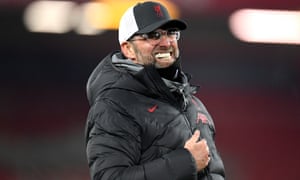[ad_1]
Between a quarter and a third of the way through the season the table is, at least, beginning to take on some sense of normality. Tottenham are first and seven points separate the top half, so it’s not entirely normal. But as a vaccine is approved, fans are allowed back in limited numbers and a return to something approximating to what we knew before can be imagined, so familiar tropes return to football. Manchester City are casually dismissing lesser sides at home, West Ham are losing leads, Everton are flaky and Liverpool are overpowering opponents at Anfield. Welcome back, normality, we’ve missed you.
Within that sense of the plates settling, of everything calming down, though, Liverpool’s situation still feels odd. The perception remains that this has been a difficult season for them. The early part of their campaign was characterised by wild football, by the 4-3 win over Leeds, the 7-2 defeat at Aston Villa and the 2-2 draw at Everton, the repercussions of which continue to be felt. There has been a raggedness to some of their play and, the win away to Atalanta aside, their Champions League form has been no better than it needed to be.
Jürgen Klopp’s spikiness after the draw at Brighton – while a reminder that he, like most managers, is a terrible loser (or drawer when the circumstances feel like a loss) – suggested a man under pressure. And that, perhaps, is understandable enough as the injuries mount up, even if blaming the broadcaster seemed misguided when the whole culture of elite football, in which Liverpool are as complicit as anybody, is founded on squeezing fans for as much as possible to watch as many games as possible.
Yet since losing Virgil van Dijk in the derby, Liverpool have conceded just four goals in six league games. Add in the Champions League and it’s six clean sheets in 11. They’ve only actually lost one league game this season, albeit a spectacular one. More than that, the last two home games, against Leicester and then Wolves, have followed a
very encouraging pattern for the champions. Both fixtures were, on the face of it, testing games against sides adept on the counter. If there were weaknesses in a back four stripped of three regulars, the sense was that these were opponents equipped to take advantage. But between them they managed just seven shots on target and lost by a combined score of 7-0. Both were entirely emphatic.
The victory over Leicester was arguably Liverpool’s best performance since beating the same opponents at the King Power last Boxing Day. The win over Wolves might even have been better, if only because it was achieved without the reassuring figure of Alisson in goal. Caoimhín Kelleher was just as assured replacing him as he had been against Ajax in midweek, though, and made one fine first-half save from Daniel Podence when the score was still 0-0.

In the long run, it may even be that these awkward few weeks come to be seen as having been a positive, in getting pitch time for players such as Kelleher, Curtis Jones and Neco Williams. The young right-back impressed again before being removed for Trent Alexander-Arnold midway through the second half. His return after a hamstring pull is, clearly, a relief for Klopp, but the form of Williams means there should be no need now for Alexander-Arnold to be flogged through seven games in 23 days as he was before sustaining the injury.
Liverpool’s unbeaten run at home now extends to 65 games, and matches like this are the kind to make opponents blanch at the prospect of a trip to Anfield, even with only 2,000 fans. Wolves, admittedly without Raúl Jiménez, who might have offered some kind of outlet, never looked like being able to build anything. This may be a slightly more restrained Liverpool than the side of a year or so ago, but it stifles opponents with similar effectiveness.
Comparisons with last season must be treated with caution given the differences in the calendar but back then Liverpool kept only two clean sheets in their first 15 league games before embarking on a run of seven in a row from early December. This season there have been three in 11. The last two games at Anfield have been characterised by a sense of a balance, of a team comfortable in holding their opponents at arm’s length but still lethal when chances come.
The stereotype of Liverpool is of relentlessness, of wave after wave of attacking. And they are capable of that, as various comebacks or demolitions have proved. But last season they also had the best defensive record in the league – and that despite a fairly ragged end after lockdown. What made them unstoppable was the three-month spell from the beginning of December to the middle of February in which they conceded just one goal in 11 games while always having the firepower to win. The Brighton game casts some doubt, but the last two home games have suggested a side rediscovering that sort of balance and relentlessness.
That it is being achieved with so many absentees is all the more ominous for the rest of the league.
[ad_2]
Source link